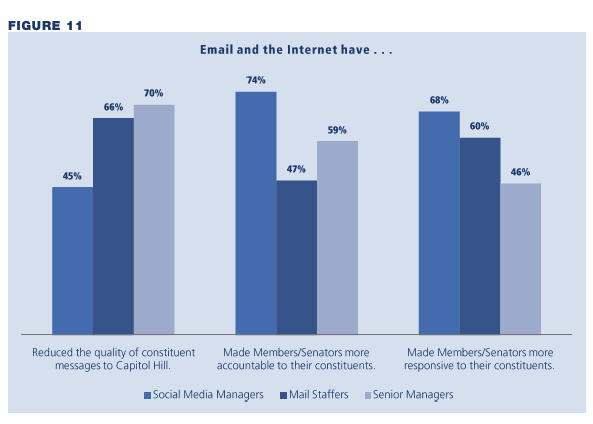 The Congressional Management Foundation just released their latest report on how 260 social media and senior staff who work for Members of Congress perceive social media. Check out some of the great data that could be very useful for your next nonprofit campaign targeting Members of Congress.
The Congressional Management Foundation just released their latest report on how 260 social media and senior staff who work for Members of Congress perceive social media. Check out some of the great data that could be very useful for your next nonprofit campaign targeting Members of Congress.
64% of Congressional offices say that they use social media to help gauge public opinion in conjunction with other traditional efforts such as constituent meetings, constituent letters, calls, etc. 34% say YouTube is somewhat or very important tool for their outreach efforts and 42% say Twitter is somewhat or very important for understanding constituents' views and opinions.
What the study doesn’t say is how are offices verifying which of their Twitter followers or FB fans are real constituents in their Districts? While yes, this maybe great news for nonprofits who are looking to put Members of Congress in the hot seat in an accountability campaign, it’s nonetheless concerning that Members of Congress maybe using social media to gauge public opinion from people they don’t even represent.
- Over 70% of senior managers and social media managers surveyed think Facebook and YouTube is somewhat or very important for communicating their Members' views. 51% say Twitter is a somewhat or very important vehicle.
- Nearly half of the social media managers feel that advocacy campaigns directed to Congress are good for democracy.
- 72% say that social media allows their Members to reach people they had previously not been in contact with.
- 63% of staffers 30 and younger feel their offices can control their message on social media, compared to 36% of staffers 51 and older who feel the same.
I found this particular statistic interesting. Social media is a fluid and organic space. It’s not a space where you can easily control messaging nor is that a very “social” attitude. People can take your message and do as they see fit. Of course if you have a good team in place, they can help get your message out and respond to criticism.
Naturally, it’s the social media managers who (who are social by nature and focused on engaging constituents) have a more positive view of constituent communications than senior managers or staffers who are primarily tasked with answering the mail. “68% of social media managers feel email and the Internet have made Senators and Representatives more responsive to their constituents, compared to less than half (46%) of the senior managers.” The foundation’s report from February of 2011 said that 87% of staffers thought email and the Internet have made it easier for constituents to become involved in public policy. 
For the record, I agree with these staffers. The more transparent Members of Congress are using email and social media combined with other mediums the better constituents are served and communicated with.
“Many staffers—especially in Democratic offices—feel their office spends too little time on online communications. More than one-third of the staffers surveyed feel their offices spend too little time on online town hall meetings, posting videos, their official website, and their official blog. Democrats were more likely than Republicans to say their offices do not spend enough time on online communications,” said the report.



COMMENTS